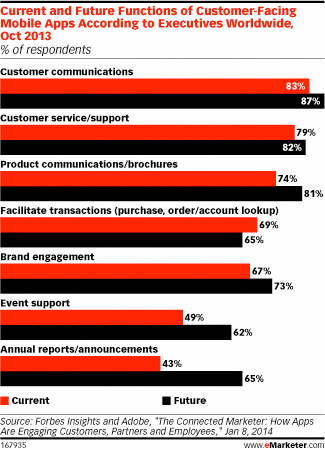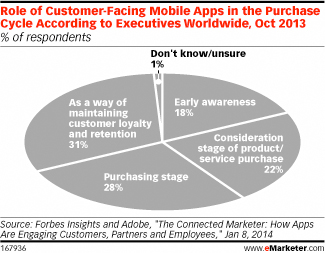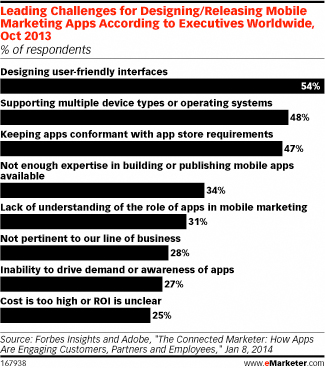Mobile Apps help Lure Customers, Spur Loyalty
January 16, 2014
![]() Mobile apps have proven to be a new tool that businesses can use to engage with customers in a variety of ways: providing information, as a customer relations management tool and to build a brand—to name just a few. An October 2013 survey of executives at companies with annual revenues of at least $250,000 conducted by Forbes Insights and Adobe found that they were using customer-facing apps for all of these reasons.
Mobile apps have proven to be a new tool that businesses can use to engage with customers in a variety of ways: providing information, as a customer relations management tool and to build a brand—to name just a few. An October 2013 survey of executives at companies with annual revenues of at least $250,000 conducted by Forbes Insights and Adobe found that they were using customer-facing apps for all of these reasons.
 However, the most common use of mobile apps was to communicate with customers, named by 83% of respondents. Next was the provision of customer service or support (79%), the provision of information about a product (74%), facilitation of transactions (69%) and brand engagement (67%).
However, the most common use of mobile apps was to communicate with customers, named by 83% of respondents. Next was the provision of customer service or support (79%), the provision of information about a product (74%), facilitation of transactions (69%) and brand engagement (67%).
 Apps clearly have a role to play in the path to purchase by allowing customers to access information about products and services at the research phase. But they also provide a means for brands to remain engaged with customers following their purchases, a useful way for companies to build loyalty. In fact, the highest percentage of respondents—31%—said the role of a mobile app during the purchase cycle was to retain customers. Twenty-eight percent thought apps played a key role at the purchasing stage, while 22% said apps were useful at the consideration stage of purchase, and 18% said they helped in creating early awareness.
Apps clearly have a role to play in the path to purchase by allowing customers to access information about products and services at the research phase. But they also provide a means for brands to remain engaged with customers following their purchases, a useful way for companies to build loyalty. In fact, the highest percentage of respondents—31%—said the role of a mobile app during the purchase cycle was to retain customers. Twenty-eight percent thought apps played a key role at the purchasing stage, while 22% said apps were useful at the consideration stage of purchase, and 18% said they helped in creating early awareness.
 Getting a return on investment (ROI) from a mobile app requires that resources be invested properly. Mobile apps face competition from a thousand other distractions offered by mobile devices—and are often limited by smaller screen sizes. A majority of those polled, 54%, named designing a user-friendly interface as the top challenge for using mobile apps. That was followed by supporting multiple devices or operating systems (48%), keeping apps in accordance with app store requirements (47%), not having the expertise to build one (34%) and lacking the fundamental understanding of apps’ roles in marketing (31%).
Getting a return on investment (ROI) from a mobile app requires that resources be invested properly. Mobile apps face competition from a thousand other distractions offered by mobile devices—and are often limited by smaller screen sizes. A majority of those polled, 54%, named designing a user-friendly interface as the top challenge for using mobile apps. That was followed by supporting multiple devices or operating systems (48%), keeping apps in accordance with app store requirements (47%), not having the expertise to build one (34%) and lacking the fundamental understanding of apps’ roles in marketing (31%).
Interestingly, the idea that the cost of an app was too high, or that the ROI it would yield was unclear, was the least of the concerns among executives responding to the survey.
Courtesy of eMarketer





























